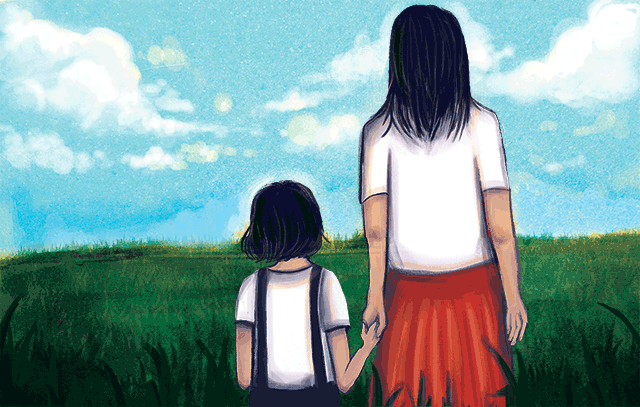North Korean Refugee Stories: Meet Yoon Suk

Yoon Suk has vivid, happy memories of growing up in North Korea. She was raised during a time when state-socialism was relatively functioning, and the government could provide basic necessities to its citizens. She remembers wearing beautiful nylon (a highly-sought after fabric back in the earlier days of North Korea) uniforms with bows and red, patent-leather shoes to school. She also had a passion for the arts and performed frequently on stage. But as she grew older, the shine in her shoes began to fade and the hunger in her belly began to grow.
After the collapse of the Soviet Union, North Korea lost crucial sources of subsidized trade and aid and the North Korean economy crashed. It was during this time that Yoon Suk got married, but what should have been a happy time in her life ended up being far from it. The regime’s mismanaged agricultural and environmental policies were confounded by harsh weather, plunging the country into a severe famine that lasted for years. Yoon Suk and her husband struggled to survive on the meager rations they received—and they were not alone. During this period, an estimated one million people died from starvation, while many of those who survived suffered immensely.
Yoon Suk, knowing that she had to do something to keep her family alive during the most difficult years of the “Arduous March,” turned to the jangmadang—small, illegal markets where people sold and traded anything they could for food. Yoon Suk was like many North Korean women in this new reality, abandoning her traditional role for market activities. Unfortunately, running her modest merchant business was more challenging than she had anticipated and she struggled to keep it afloat. As the situation grew worse, she discontinued her business and looked for other ways to support her family, which had grown by two with the birth of her sons. It was during this time that she learned that life might be better in booming China.
As recently as three decades ago, Chinese people were on average poorer than their North Korean neighbors. But China’s economic reforms have produced wealth and opportunities that are the envy of nearly all North Koreans today. Since North Korea’s economic collapse, which lead to unprecedented cross-border movement and inflows of Chinese goods and media, North Koreans have gained a painful awareness of just how far their formerly impoverished Chinese neighbors have come.

But it’s extremely risky for North Koreans to escape their country. The North Korean regime makes it illegal to leave without explicit permission and if Yoon Suk was caught trying to escape, or caught in China and sent back, she would be punished severely. Yet, the opportunity was too great to pass up and she fled for the first time in the mid-2000s.
Once she arrived, alone in a foreign country where she didn’t speak the language, Yoon Suk was sold to a Chinese man as his bride. China’s lack of marriageable women, particularly in rural areas of the northeast, creates high demand for female North Korean refugees like Yoon Suk. Without legal status and no protection from the authorities, these women are often kidnapped by sex traffickers and sold, sometimes for as little as $200.

Even though she was now living with a Chinese man, Yoon Suk still wasn’t safe from the watchful eye of the Chinese authorities. North Korean refugees’ well-founded fear of persecution if repatriated means that they should be protected under international refugee law. However, the Chinese government labels them as “economic migrants,” so they can forcibly send them back, as per their agreement with the North Korean regime. Yoon Suk was caught by Chinese police not even a month after arriving and was forcibly repatriated back to North Korea. There, the authorities sent her to a prison camp, where she was abused, beaten, and starved.
After all she had gone through, Yoon Suk was still undeterred from finding freedom outside of North Korea. She escaped again to China shortly after her release from the prison camp. She was sold off three times by traffickers, again under the pretense that she was going to be given work. With the last husband, she had her beautiful daughter.

Yoon Suk wanted to give her daughter a better life, and knew that would not be possible in China. Without the proper documentation, her daughter would have difficulty even going to school and would be denied the opportunities available to other Chinese children. Yoon Suk and her daughter escaped China together through Liberty in North Korea’s network and are now on their way to safety in South Korea.
Yoon Suk is excited for the life and opportunities that lie ahead of her. She’s a talented cook and wants to explore the option of obtaining a culinary certificate in South Korea. She also has high hopes for her daughter, who loves art just like her mother did as a young girl, and wants to enroll her in dance and painting lessons. Yoon Suk’s greatest wish is to reunite with her two adult sons someday. She often dreams about appearing on TV to send a message to her sons, showing them she’s alive and well.
Thank you for helping supply the funds for Yoon Suk’s rescue. Your efforts have changed her life and have provided the opportunity for her to enjoy her new LIBERTY.
Fundraise or donate to help rescue more North Korean refugees today!
Life in Freedom: A Conversation with Brian

For many years, Brian lived a charmed life in North Korea. He had a loving family, a university education, and a full stomach, but everything changed when the government stopped providing rations and wages for work. To make extra money, Brian's father began working as a broker, helping desperate North Koreans escape to China.
When his father was outed in a newspaper for helping a high profile defector escape, the entire family was put in danger. Brian's parents immediately fled to China. He followed soon thereafter, but was captured upon arrival by Chinese police. He spent the next two weeks in a detention center in China, where he was routinely beaten. Thankfully, LiNK was able to pay for his release so he could avoid repatriation.
Since resettling in South Korea, Brian's been very busy. He began attending university shortly after he arrived, hoping to become a journalist in the future so he can write about North Korea for an international audience. This year, he got married to another North Korean defector and they're now expecting their first child.
Our resettlement coordinator Jihyun was able to catch up with Brian recently to talk about what his life has been like since resettling.

Jihyun: What is the best thing that happened to you this week?
Brian: My pregnant wife and I found out that we are having a daughter! Yeah, we are so happy!I felt so bad watching my wife going through morning sickness. She couldn’t eat properly until recently.
Jihyun: So did you not eat when she couldn’t eat because you felt so bad for her?
Brian: Oh, no. I still ate well, because...you know, I was hungry. Haha.
Jihyun: Oh yeah, I understand. Of course you had to eat well so you could protect and take good care of her when she couldn’t eat. (Brian, his wife, and the photographer laugh.)

Jihyun: What was the most difficult thing when you got out of Hanawon (resettlement center for North Korean defectors)?
Brian: When I first graduated from Hanawon, I still had a thick North Korean accent so people looked at me whenever I started talking, which made me so uncomfortable.
Jihyun: What was your biggest challenge in North Korea? What's your biggest challenge in South Korea?
Brian: In North Korea I didn’t have a lot of difficulty because I was lucky to have a well-off family there. In fact, after I came to South Korea I started having a lot of difficulties because I had to adjust to the new society.
I think getting a job is one of the most difficult challenges for many resettled North Korean refugees. Especially since I am about to graduate from college and have a wife and a baby coming, I feel a little pressure. I just want more South Korean companies to hire more resettled North Koreans without discrimination/stereotype. I have heard from many of my North Korean friends that they have a hard time getting jobs because many companies have negative stereotypes about North Korean people, so they don’t want to hire North Korean candidates.
I am not saying that they have to hire us because we are from North Korea, but I want more companies to willingly hire us if we are qualified regardless of our background.
Also, I believe North Korean defectors in South Korea are still underprivileged in society and have a lot of obstacles. I hope there will be more effective job training and employment programs until more resettled North Koreans settle down in their specific work fields.

Jihyun: What is it like living in freedom in South Korea?
Brian: I really appreciate the freedom that I have here. In some of my college classes, I got to study the South Korean constitution that guarantees our freedom. There are so many types of freedom that I can enjoy. I can’t even count them because there are so many. One thing is the freedom of traveling anywhere I want. Back in North Korea, even traveling to another area was so difficult. Here, as long as I don’t cause trouble or break the law, no one can take away my freedom of movement.

Jihyun: Have you helped any other defectors resettle in South Korea? How?
Brian: Well, I wish I could do more, but right now what I can do is to help other resettled North Korean refugees who want to go to college by sharing my experience and giving them useful tips and advice about college life.
Jihyun: Have your perceptions of Americans and South Koreans changed?
Brian: In North Korea I didn’t really think South Koreans were very different than us because I thought we were all Koreans—the same blood. However, my perception of Americans changed a lot especially after I met LiNK staff and learned about LiNK's supporters.
I used to think Americans were so weird and selfish, because that was how I was taught about Americans in North Korea.
When I was caught by the Chinese police in China, LiNK helped me so much to be released and come to South Korea. I was so moved by that.

Jihyun: What advice would you give to a friend who just arrived in South Korea?
Brian: I want to share everything I have learned with him. I would say to him that he has to do what he wants. There are many options that you can choose for what you are going to do in this new society. If you don’t want to regret your decision in the future, you have to do what you like.

Jihyun: How often do you think about North Korea? What do you think about?
Brian: Not quite often, but I start thinking about North Korea when I am stressed out about my studies or finding a job, because I didn’t really worry about those kinds of things back in North Korea. When I am thinking of North Korea, I usually picture hanging out with my friends there. We played a lot of games, including card games. Also I liked drinking with my good friends too, haha.
Lastly I want to take this chance to say thanks to LiNK staff, volunteers, and supporters. I always appreciate them and thinking about them gives a lot of hope and motivation to do my best for my life.




